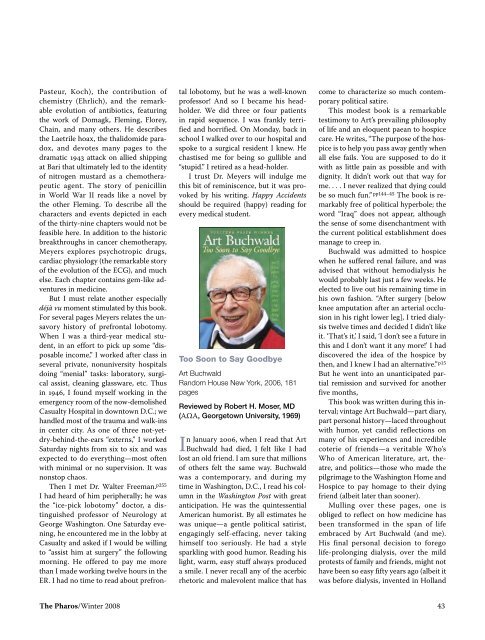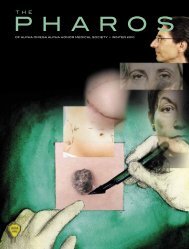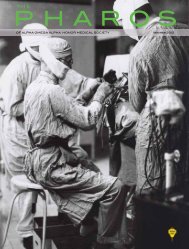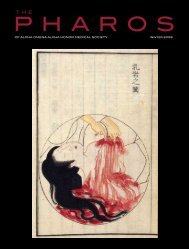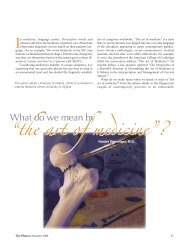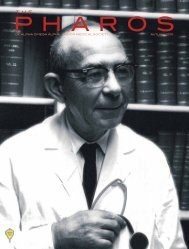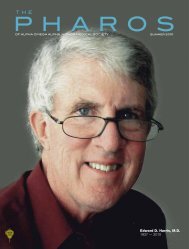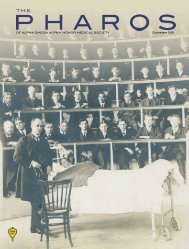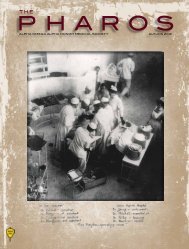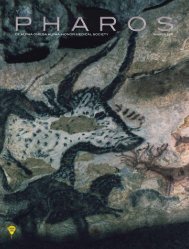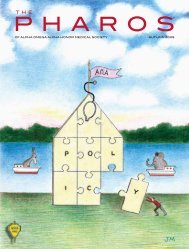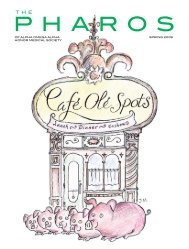Download The Pharos Winter 2008 Edition - Alpha Omega Alpha
Download The Pharos Winter 2008 Edition - Alpha Omega Alpha
Download The Pharos Winter 2008 Edition - Alpha Omega Alpha
You also want an ePaper? Increase the reach of your titles
YUMPU automatically turns print PDFs into web optimized ePapers that Google loves.
Pasteur, Koch), the contribution of<br />
chemistry (Ehrlich), and the remarkable<br />
evolution of antibiotics, featuring<br />
the work of Domagk, Fleming, Florey,<br />
Chain, and many others. He describes<br />
the Laetrile hoax, the thalidomide paradox,<br />
and devotes many pages to the<br />
dramatic 1943 attack on allied shipping<br />
at Bari that ultimately led to the identity<br />
of nitrogen mustard as a chemotherapeutic<br />
agent. <strong>The</strong> story of penicillin<br />
in World War II reads like a novel by<br />
the other Fleming. To describe all the<br />
characters and events depicted in each<br />
of the thirty-nine chapters would not be<br />
feasible here. In addition to the historic<br />
breakthroughs in cancer chemotherapy,<br />
Meyers explores psychotropic drugs,<br />
cardiac physiology (the remarkable story<br />
of the evolution of the ECG), and much<br />
else. Each chapter contains gem-like adventures<br />
in medicine.<br />
But I must relate another especially<br />
déjà vu moment stimulated by this book.<br />
For several pages Meyers relates the unsavory<br />
history of prefrontal lobotomy.<br />
When I was a third-year medical student,<br />
in an effort to pick up some “disposable<br />
income,” I worked after class in<br />
several private, nonuniversity hospitals<br />
doing “menial” tasks: laboratory, surgical<br />
assist, cleaning glassware, etc. Thus<br />
in 1946, I found myself working in the<br />
emergency room of the now- demolished<br />
Casualty Hospital in downtown D.C.; we<br />
handled most of the trauma and walk-ins<br />
in center city. As one of three not-yetdry-<br />
behind-the-ears “externs,” I worked<br />
Saturday nights from six to six and was<br />
expected to do everything—most often<br />
with minimal or no supervision. It was<br />
nonstop chaos.<br />
<strong>The</strong>n I met Dr. Walter Freeman. p255<br />
I had heard of him peripherally; he was<br />
the “ice-pick lobotomy” doctor, a distinguished<br />
professor of Neurology at<br />
George Washington. One Saturday evening,<br />
he encountered me in the lobby at<br />
Casualty and asked if I would be willing<br />
to “assist him at surgery” the following<br />
morning. He offered to pay me more<br />
than I made working twelve hours in the<br />
ER. I had no time to read about prefrontal<br />
lobotomy, but he was a well-known<br />
professor! And so I became his headholder.<br />
We did three or four patients<br />
in rapid sequence. I was frankly terrified<br />
and horrified. On Monday, back in<br />
school I walked over to our hospital and<br />
spoke to a surgical resident I knew. He<br />
chastised me for being so gullible and<br />
“stupid.” I retired as a head- holder.<br />
I trust Dr. Meyers will indulge me<br />
this bit of reminiscence, but it was provoked<br />
by his writing. Happy Accidents<br />
should be required (happy) reading for<br />
every medical student.<br />
Too Soon to Say Goodbye<br />
Art Buchwald<br />
Random House New York, 2006, 181<br />
pages<br />
Reviewed by Robert H. Moser, MD<br />
(AΩA, Georgetown University, 1969)<br />
In January 2006, when I read that Art<br />
Buchwald had died, I felt like I had<br />
lost an old friend. I am sure that millions<br />
of others felt the same way. Buchwald<br />
was a contemporary, and during my<br />
time in Washington, D.C., I read his column<br />
in the Washington Post with great<br />
anticipation. He was the quintessential<br />
American humorist. By all estimates he<br />
was unique—a gentle political satirist,<br />
engagingly self- effacing, never taking<br />
himself too seriously. He had a style<br />
sparkling with good humor. Reading his<br />
light, warm, easy stuff always produced<br />
a smile. I never recall any of the acerbic<br />
rhetoric and malevolent malice that has<br />
come to characterize so much contemporary<br />
political satire.<br />
This modest book is a remarkable<br />
testimony to Art’s prevailing philosophy<br />
of life and an eloquent paean to hospice<br />
care. He writes, “<strong>The</strong> purpose of the hospice<br />
is to help you pass away gently when<br />
all else fails. You are supposed to do it<br />
with as little pain as possible and with<br />
dignity. It didn’t work out that way for<br />
me. . . . I never realized that dying could<br />
be so much fun.” pp144–45 <strong>The</strong> book is remarkably<br />
free of political hyperbole; the<br />
word “Iraq” does not appear, although<br />
the sense of some disenchantment with<br />
the current political establishment does<br />
manage to creep in.<br />
Buchwald was admitted to hospice<br />
when he suffered renal failure, and was<br />
advised that without hemodialysis he<br />
would probably last just a few weeks. He<br />
elected to live out his remaining time in<br />
his own fashion. “After surgery [below<br />
knee amputation after an arterial occlusion<br />
in his right lower leg], I tried dialysis<br />
twelve times and decided I didn’t like<br />
it. ‘That’s it,’ I said, ‘I don’t see a future in<br />
this and I don’t want it any more!’ I had<br />
discovered the idea of the hospice by<br />
then, and I knew I had an alternative.” p15<br />
But he went into an unanticipated partial<br />
remission and survived for another<br />
five months,<br />
This book was written during this interval;<br />
vintage Art Buchwald—part diary,<br />
part personal history—laced throughout<br />
with humor, yet candid reflections on<br />
many of his experiences and incredible<br />
coterie of friends—a veritable Who’s<br />
Who of American literature, art, theatre,<br />
and politics—those who made the<br />
pilgrimage to the Washington Home and<br />
Hospice to pay homage to their dying<br />
friend (albeit later than sooner).<br />
Mulling over these pages, one is<br />
obliged to reflect on how medicine has<br />
been transformed in the span of life<br />
embraced by Art Buchwald (and me).<br />
His final personal decision to forego<br />
life- prolonging dialysis, over the mild<br />
protests of family and friends, might not<br />
have been so easy fifty years ago (albeit it<br />
was before dialysis, invented in Holland<br />
<strong>The</strong> <strong>Pharos</strong>/<strong>Winter</strong> <strong>2008</strong> 43


